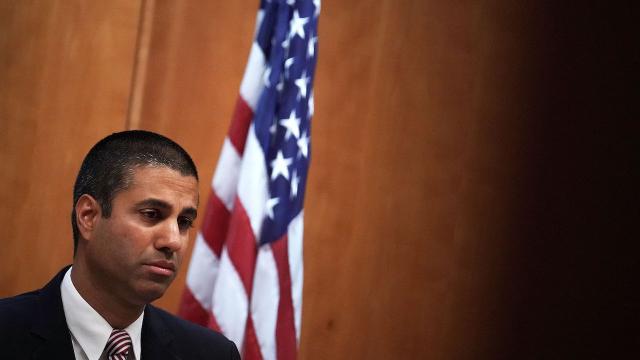The bombastic, high-profile war over net neutrality isn’t over — but the battle is about to move deep into the weeds.
In a party-line vote last Thursday, the FCC’s three Republican commissioners voted to repeal and replace the 2015 Open Internet Order, giving broadband carriers the ability to legally block or throttle content and to create “fast lanes” for companies willing to pay more to have their services delivered at faster speeds.
Two efforts to undo the FCC’s new rules will unfold in the coming weeks. The first will play out like a highly partisan game of chess. If the first path fails, the second will be a brawl in the court of law.
Resolution for the win
In many ways, the first effort presents a win-win scenario for the Democrats, who announced last week a plan to overturn the order by passing a joint resolution under the Congressional Review Act (CRA). If the resolution somehow succeeds, the Democrat Party will declare a major victory and the Obama-era rules enforcing net neutrality will survive.
If the resolution fails, the blame will fall squarely on the Republicans, who may be drastically underestimating how much of an issue net neutrality will be in next year’s midterm elections. Overwhelmingly, Republican voters oppose what the FCC is doing, according to an extensive recent survey.
If the Democrats manage to pass the bill with a simple majority, President Donald Trump is all but guaranteed to veto. (The White House did not respond to a request for comment regarding the impending CRA resolution.) This means a supermajority — a two-thirds vote in the House and Senate — will be required to overturn the FCC order. That would force numerous Republicans to mutiny, turning their backs on the White House and party leaders like House Speaker Paul Ryan who are enthusiastic supporters of the FCC’s deregulatory efforts.
This effort, regardless of the resolution’s fate, will finally place individual GOP lawmakers’ support or opposition to net neutrality on the record for all to see. That matters: The aforementioned survey, conducted in part by the University of Maryland’s Program for Public Consultation, revealed that only one in five Republican voters support FCC Chairman Ajit Pai’s order repealing federal net neutrality rules.
Will Republicans stand by President Trump, or will they acquiesce to the will of Republican voters? A plethora of wealthy campaign contributors support the FCC’s decision, including (obviously) the broadband providers themselves. So the question is, who gets the shaft: millions of voters or the president and a handful of wealthy donors?
There are clear parallels here to the GOP’s tax bill, and it’s pretty clear which direction that’s headed.
Having witnessed the unprecedented response to the FCC’s rulemaking process over the course of this summer, Democrats are already announcing plans to mobilize around the issue — hoping to translate Americans’ fury over the FCC’s decision into Democratic electoral victories next year. As Sen. Brian Schatz told Gizmodo in an interview last week, Democrats needed to “focus on converting all of this justified outrage into electoral power.”
Under the CRA procedures, a copy of the FCC’s new rules — officially known as the Restoring Internet Freedom Order — must first be submitted to Congress and printed in the Federal Register, the government’s daily journal in which all rules and public notices are published. But before that happens, the FCC must release a final copy of the order itself, which is where the second effort to undo the rules will begin.
See you in court, FCC
Within a 10-day period after the FCC publishes the order — which could happen at any moment, but is just as likely to come next week — a slew of legal challenges will be filed across the country by net neutrality proponents demanding a court review of the rules. Another round of filings will follow the order’s publication in the federal register, which, based on how the process unfolded in 2015, may happen more than a month from now.
Petitioners will have 60 days to join the lawsuit, which will include numerous net neutrality advocacy organisations, such as Free Press, but may also include trade groups, such as the Internet Association (IA), which represents Amazon, Facebook, Google, Netflix, eBay, Uber, Lyft, Reddit, and more — companies that have historically supported strong net neutrality rules. It’s too early to say which organisations will join the fight, though IA President and CEO Michael Beckerman said last week the trade association was “weighing … legal options in a lawsuit” against the order.
A Netflix spokesperson told Gizmodo on Monday that the order was still fresh and that it was too early to share what’s to come; however, citing the “longer legal battle” ahead, the company tweeted last week that it planned to “stand with innovators, large and small, to oppose this misguided FCC order.”
What’s more, citing allegations of identity theft and fraud at the FCC, 18 state attorneys general signed a letter last week condemning the order and announcing plans to sue the FCC.
In many ways, ripping off the band-aid and overturning the rules now is likely the best hope the GOP has for stemming the rising tide of voter resentment. Defending cable companies in election debates next year doesn’t seem like a winning strategy. And a prolonged legal battle before the US court of appeals, which isn’t likely to end before the November 6th elections, will only keep the matter fresh in the minds of voters on their journey to the ballot box.
